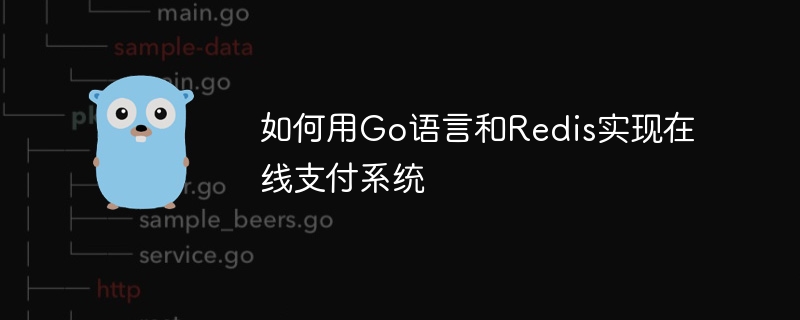Home >Backend Development >Golang >How to implement an online payment system using Go language and Redis
How to implement an online payment system using Go language and Redis
- 王林Original
- 2023-10-27 16:28:411571browse

How to implement an online payment system using Go language and Redis
Introduction:
With the rapid development of e-commerce, more and more people choose to pay online to complete various transactions. As one of the core and important components of the online payment system, the payment system must be efficient, safe, and reliable. This article will introduce how to use Go language and Redis to implement a simple online payment system, and provide specific code examples.
1. System architecture design
Before starting the implementation, we need to design the system architecture. A basic online payment system usually includes the following components:
- User: the payment participant of the system, who owns the account and funds.
- Merchant: A transaction participant in the system who can receive payment requests and complete transactions.
- Payment gateway: Responsible for receiving the user's payment request and calling the payment interface to complete the payment transaction.
- Fund account: Save the financial information of users and merchants, and record the flow of funds.
- Transaction record: Save transaction-related information for subsequent inquiries and statistics.
2. Database design
In this system, we use Redis as the main database service to store information about users, merchants, capital accounts and transaction records.
The following is the design of each data structure:
- User information (hash structure):
key: user:userid
field: username, password, balance - Merchant information (hash structure):
key: merchant:merchantid
field: merchantname, password - Fund account information (hash structure):
key: account:accountid
field : userid, merchantid, balance - Transaction record (list structure):
key: transactions
value: Transaction information in json format
3. Code implementation
The following is a sample code for implementing an online payment system using Go language and Redis:
-
User Registration
func registerUser(username, password string) error { // 生成唯一的userid userid := generateUserID() // 检查用户名是否已存在 if exists("user:" + username) { return fmt.Errorf("Username already exists") } // 创建用户信息 user := make(map[string]interface{}) user["username"] = username user["password"] = password user["balance"] = 0 // 保存用户信息到Redis setJSON("user:"+userid, user) return nil } -
Merchant Registration
func registerMerchant(merchantname, password string) error { // 生成唯一的merchantid merchantid := generateMerchantID() // 检查商家名是否已存在 if exists("merchant:" + merchantname) { return fmt.Errorf("Merchant name already exists") } // 创建商家信息 merchant := make(map[string]interface{}) merchant["merchantname"] = merchantname merchant["password"] = password // 保存商家信息到Redis setJSON("merchant:"+merchantid, merchant) return nil } -
Create payment order
func createPaymentOrder(userid, merchantid string, amount float64) error { // 检查用户是否存在 if !exists("user:" + userid) { return fmt.Errorf("User not found") } // 检查商家是否存在 if !exists("merchant:" + merchantid) { return fmt.Errorf("Merchant not found") } // 检查用户余额是否足够 if getBalance("user:"+userid) < amount { return fmt.Errorf("Insufficient balance") } // 生成唯一的orderid orderid := generateOrderID() // 创建订单信息 order := make(map[string]interface{}) order["userid"] = userid order["merchantid"] = merchantid order["amount"] = amount order["status"] = "Created" // 保存订单信息到Redis setJSON("order:"+orderid, order) return nil } -
Payment order
func confirmPayment(orderid, password string) error { // 检查订单是否存在 if !exists("order:" + orderid) { return fmt.Errorf("Order not found") } // 获取订单信息 order := getJSON("order:" + orderid).(map[string]interface{}) // 检查订单状态是否正确 if order["status"] != "Created" { return fmt.Errorf("Invalid order status") } // 检查商家密码是否正确 merchant := getJSON("merchant:" + order["merchantid"].(string)).(map[string]interface{}) if merchant["password"] != password { return fmt.Errorf("Invalid merchant password") } // 扣除用户余额 balance := getBalance("user:" + order["userid"].(string)) balance -= order["amount"].(float64) setBalance("user:"+order["userid"].(string), balance) // 增加商家余额 balance = getBalance("merchant:" + order["merchantid"].(string)) balance += order["amount"].(float64) setBalance("merchant:"+order["merchantid"].(string), balance) // 更新订单状态 order["status"] = "Paid" setJSON("order:"+orderid, order) // 创建交易记录 transaction := make(map[string]interface{}) transaction["orderid"] = orderid transaction["userid"] = order["userid"].(string) transaction["merchantid"] = order["merchantid"].(string) transaction["amount"] = order["amount"].(float64) pushJSON("transactions", transaction) return nil }
4. Summary
This article introduces how to use Go language and Redis to implement a simple online payment system. By rationally designing the system architecture and flexibly using Redis' data structures and commands, we can easily manage information about users, merchants, fund accounts and transaction records, and implement payment functions. Of course, actual online payment systems still need to consider more security, performance, and scalability issues, but the code examples provided in this article can be used as a good starting point for readers to refer to and learn from.
References:
[1] Go language official documentation: https://golang.org/
[2] Redis official documentation: https://redis.io/
The above is the detailed content of How to implement an online payment system using Go language and Redis. For more information, please follow other related articles on the PHP Chinese website!

